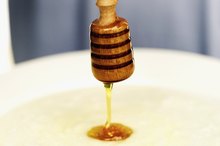What does fact checked mean?
At Healthfully, we strive to deliver objective content that is accurate and up-to-date. Our team periodically reviews articles in order to ensure content quality. The sources cited below consist of evidence from peer-reviewed journals, prominent medical organizations, academic associations, and government data.
- National Institute of Allergy and Infectious Disease: Sinusitis
- Asian Pacific Journal of Tropical Biomedicine: Honey: Its Medicinal Property and Antibacterial Activity
- Asian Pacific Journal of Tropical Biomedicine: Honey: Its Medicinal Property and Antibacterial Activity
- Journal of Otolaryngology - Head & Neck Surgery: Effectiveness of Honey on Staphylococcus Aureus and Pseudomonas Aeruginosa Biofilms
- Journal of Otolaryngology - Head & Neck Surgery: Effectiveness of Honey on Staphylococcus Aureus and Pseudomonas Aeruginosa Biofilms
- Journal of Otolaryngology - Head & Neck Surgery: Single-Blind Study of Manuka Honey In Allergic Fungal Rhinosinusitis
- Journal of Otolaryngology - Head & Neck Surgery: Single-Blind Study of Manuka Honey In Allergic Fungal Rhinosinusitis
The information contained on this site is for informational purposes only, and should not be used as a substitute for the advice of a professional health care provider. Please check with the appropriate physician regarding health questions and concerns. Although we strive to deliver accurate and up-to-date information, no guarantee to that effect is made.
Can Honey Clear Up Sinus Problems?
Nasal congestion, facial pain and post-nasal drip are common symptoms of sinusitis, or sinus infection. Thirty million adults were diagnosed with sinusitis in 2011, according to the National Institute of Allergy and Infectious Disease 1. Antibiotics are a common treatment for sinusitis, but long-term use of these drugs for chronic sinus problems is not supported by clinical research. Honey has been studied as an alternative therapy for this condition.
If you are experiencing serious medical symptoms, seek emergency treatment immediately.
Honey Fights Bacteria
Honey has long been touted for its antibacterial properties. According to a 2011 article in “Asian Pacific Journal of Tropical Biomedicine,” honey’s ability to fight bacteria may be related to its acidic pH, high sugar content and enzymes in some honeys that produce hydrogen peroxide 2. The sticky sweet stuff has been used to treat conditions ranging from infected wounds to peptic ulcers and urinary tract infections.
Contrary Cultures
Chamomile & Honey Tea for Laryngitis
Learn More
Conflicting research exists for the use of honey as an effective sinus infection treatment. In a study published in 2009 in the “Journal of Otolaryngology - Head & Neck Surgery,” researchers colonized two strains of bacteria that commonly cause sinus infections 4. The rate at which honey killed the bacteria was significantly higher than that of antibiotics typically prescribed for sinusitis, according to the authors. In a human study in the “Journal of Otolaryngology - Head & Neck Surgery” published in 2011, participants used a honey-saline spray daily for 30 days 34. Nine of the 34 treatment subjects experienced symptom relief, but the honey spray had no effect on the amount of bacteria present in their sinuses when scientists tested this.
Related Articles
References
- National Institute of Allergy and Infectious Disease: Sinusitis
- Asian Pacific Journal of Tropical Biomedicine: Honey: Its Medicinal Property and Antibacterial Activity
- Journal of Otolaryngology - Head & Neck Surgery: Effectiveness of Honey on Staphylococcus Aureus and Pseudomonas Aeruginosa Biofilms
- Journal of Otolaryngology - Head & Neck Surgery: Single-Blind Study of Manuka Honey In Allergic Fungal Rhinosinusitis
- U.S. Department of Agriculture. Honey. FoodData Central. 2019.
- Cianciosi D, Forbes-Hernández TY, Afrin S, et al. Phenolic Compounds in Honey and Their Associated Health Benefits: A Review. Molecules. 2018;23(9):2322. doi:10.3390/molecules23092322
- Oduwole O, Udoh EE, Oyo-Ita A, Meremikwu MM. Honey for acute cough in children. Cochrane Database Syst Rev. 2018;4:CD007094. doi:10.1002/14651858.CD007094.pub5
- Pasupuleti VR, Sammugam L, Ramesh N, Gan SH. Honey, Propolis, and Royal Jelly: A Comprehensive Review of Their Biological Actions and Health Benefits. Oxid Med Cell Longev. 2017;2017:1259510. doi:10.1155/2017/1259510
- Aguiar R, Duarte FC, Mendes A, Bartolomé B, Barbosa MP. Anaphylaxis caused by honey: A case report. Asia Pac Allergy. 2017;7(1):48-50. doi:10.5415/apallergy.2017.7.1.48
- American Academy of Pediatrics. Botulism. HealthyChildren.org. Updated November 19, 2018.
- National Honey Board. Honey Varietals. 2020.
Writer Bio
Amy Long Carrera is a registered dietitian in Los Angeles who has been writing since 2007 for such publications as The Insider, On the Other Side and Arthritis Today. She is a certified nutrition support clinician and her writing employs current research to provide evidence-based nutrition information. Carrera holds a master of science degree in nutrition from California State University, Northridge.









